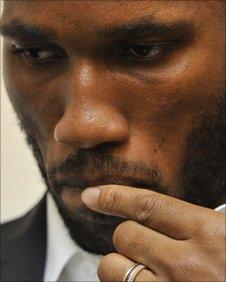Didier Drogba the peacemaker
- Published
Peacemaker Drogba's hopes for his homeland
Sleek, gleaming black Ferrari. Tick. Shoes without socks. Tick. Expensively but understatedly dressed. Tick.
So, Didier Drogba, tell us why your fellow centre-forward Fernando Torres has scored just two goals since his January move from Liverpool, external?
Hold on a minute, Drogba is not here to talk about the £50m misfiring Spaniard, he is here to talk about Ivory Coast peace.
If Drogba is a hero to Chelsea fans, he is even more highly revered in his home country. That is why he has been named as one of the 11 members of Ivory Coast's Truth and Reconciliation Commission.
It is estimated around 3,000 people were killed and 500,000 displaced in violence after last November's disputed presidential vote and the Commission, much like the one in post-apartheid South Africa, has been set up to investigate the violence that broke out.
Drogba told BBC Sport: "Former Prime Minister Charles Konan Barry called and explained he needed me to help him to bring peace in the Ivory Coast. I just said, 'Yes'.
"The war that happened a few months ago was crazy. It was unbelievable for all the Ivorians. We couldn't believe it was happening and we need to sit together and speak about it to make sure it is the first and last time."
Ivory Coast captain Drogba is an immediately recognisable global sports star who has won Premier League titles, plus FA and Carling Cups.
Yet, despite the trophies, medals and goals, perhaps the defining image of Drogba is of a man out of control - his face contorted in rage, swearing into a TV camera in fury at Norwegian referee Tom Henning Ovrebo after Chelsea lost to Barcelona in the Champions League in 2009, external.
It is hard to square that raging bull of two years ago with the man sitting in a London hotel. He is so softly spoken you have to strain to hear the 33-year-old talking about the new direction his life is taking.
Drogba is well aware of the power his high profile as a Premier League player can give.
He said: "Without being a football player, I'm not sure you would be sitting here talking about my country."
A glimpse at the media scrum that has enveloped him makes it hard to disagree.
If Drogba had not accepted the request to help out his country, the Ivory Coast's Truth and Reconciliation Commission might have merited at best a footnote in a national newspaper's foreign pages.

Drogba was named African footballer of the year in 2006 and 2009
But the footballer will not be dissuaded from putting his head above the parapet just as he did in 2005 when, after the Ivory Coast qualified for the World Cup in Germany, he pleaded with warring combatants in the African country to lay down their arms.
Drogba said: "It's not about trying to promote myself.
"I'm not Superman, I'm not going to save the country on my own. The only people that change things are the Ivorians.
"People have said a few things, 'You are going to get involved [in politics] but what are you going to do for us?' I can't change people's lives but I'm here to listen."
The Chelsea forward is equally insistent the sport he plays can help the healing process in his country and can improve people's lives in a way governments cannot.
Drogba added: "Football can generate excitement and bring people together. I know we can do something good."
He spent much of his early life in France and has been in England with Chelsea since 2004, external. As you listen to him, he comes across as extremely thoughtful and eloquent. There is also no disputing the pull the Ivory Coast has for him.
"I prefer peope to see me as an Ivorian and as a patriot," said Drogba, whose foundation, external works to provide people with basic healthcare and education.
He reveals he has spoken "many times" with other Ivory Coast internationals such as Manchester City's Kolo Toure and fellow Chelsea forward Salomon Kalou about the problems his country faces.
He added: "They want to help but I also speak to the Ivorians in the street in the country and I speak for them as well."
The interview concludes and an autograph hunter asks Drogba to sign a photograph. The striker wants to know who the autograph is for and takes great care in penning his signature before moving on to the next media interview.
Then he is gone and the Torres question will have to wait for another time - at the moment Drogba has more pressing matters on his mind.